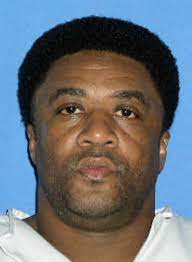Lonnie Johnson was executed by the State of Texas for two murders
According to court documents Lonnie Johnson would ask the two victims for a ride. Shortly after Johnson would pull out a gun and rob the pair before fatally shooting them: Gunar Nelson Fulk and Leroy McCaffrey Jr.
Lonnie Johnson would be arrested, convicted and sentenced to death
Lonnie Johnson would be executed by lethal injection on July 24 2007
Lonnie Johnson Photos

Lonnie Johnson FAQ
When Was Lonnie Johnson Executed
Lonnie Johnson was executed on July 24 2007
Lonnie Johnson Case
Condemned inmate Lonnie Earl Johnson had told prison officials he was sure he’d be spared the executioner. “He was pretty confident his appeals would keep him alive,” said Texas Department of Criminal Justice spokesman Jason Clark, who saw Johnson when he arrived at the death house.
Johnson got about an extra 30 minutes Tuesday evening while the U.S. Supreme Court considered his final appeal. Then the appeal was rejected, and the 44-year-old Johnson became the 19th Texas prisoner put to death this year.
Johnson didn’t deny killing Sean Fulk Schulz, 16, and his friend Leroy McCaffrey Jr., 17, and taking their pickup truck, but insisted the slayings 17 years ago outside Tomball in northwest Harris County were in self-defense after the pair pulled a gun and made racial threats against him. Johnson was black, his two victims white. “It’s been a joy and a blessing,” he told a friend who watched through a window in the death chamber. “Give everybody my regards and my love. I’ll see you in eternity.” Eight minutes later, he was pronounced dead.
Six relatives of his victims, including each of their mothers, watched through another window but Johnson never looked at them. They declined to speak with reporters following the lethal injection. “We’re being punished,” Chris Schulz, whose son was one of the slain teens, said earlier. “We’re going through our own prison sentence here. We’re going to go through it all our lives. “All I can do for him is to go to his grave and make sure he can be remembered … If it wasn’t for the victims, there wouldn’t be an execution. People need to remember that.”
Lawyers for Johnson had contended Harris County prosecutors withheld evidence favorable to him and jurors who decided he should die never heard about the racial slurs that he said led to the shootings. State lawyers denied the allegations. The 5th U.S. Circuit Court of Appeals earlier Tuesday afternoon also had dismissed Johnson’s appeal. “Johnson’s claims are too tenuous,” the appeals court said. “Although Johnson alleges that the two victims were racist, he makes no such showing.”
Johnson contended the teens offered him a ride home from a convenience store in Tomball and he accepted. During the ride, Johnson said they pulled a gun on him and threatened him. He said he when he wrestled with the pair to grab the weapon, they were shot.
The bodies of McCaffrey, known as “Punkin,” and Schulz, known to his family and friends as “Bubba,” were spotted the next morning by a motorist. Johnson acknowledged taking their pickup truck and driving to Austin to see his girlfriend, who worked at a topless club. He traded the gun to buy some drugs, he said. He was arrested about two weeks later in Austin.
McCaffrey and Schultz attended Magnolia High School in Montgomery County. The night of Aug. 15, 1990, McCaffrey met his friend getting off work as a grocery store stocker, and the pair stopped at the convenience store to see a girl they knew. According to the store clerk, Johnson said he needed a lift because his car had broken down. Johnson said from death row he was out jogging and had no car. Prosecutors said the story about the disabled car was a ruse.
“What I got wasn’t justice,” Johnson said last week from death row. “I feel like I was betrayed.” Johnson had no previous prison record, but evidence at trial indicated a history of aggressive behavior, including fights with other inmates at the Harris County Jail while awaiting trial.
Death penalty opponents noted Johnson was the 100th person executed after being given a death sentence by a Harris County jury. The total for the county is more than any other state except Texas, where Johnson became the 398th convicted killer to receive lethal injection since the state resumed capital punishment in 1982. “A grim milestone for a system that is costly, racially biased and may have put innocent men to death,” said Jared Feuer, southern regional director for the human rights group Amnesty International, which opposes capital punishment in all instances.
The next Texas inmate scheduled to die is Kenneth Parr, convicted of the January 1998 rape-slaying of Linda Malek, 28, at her Matagorda County home. The Aug. 15 punishment is one of five lethal injections set for the month in Huntsville.









